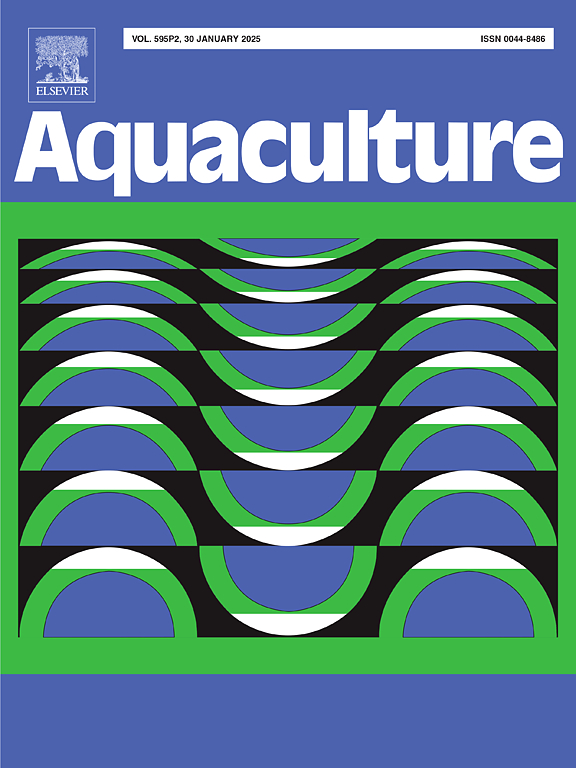Exploring the symbiotic resilience of boring giant clams and zooxanthellae during heatwave conditions: An investigation into strategic countermeasures
IF 3.9
1区 农林科学
Q1 FISHERIES
引用次数: 0
Abstract
Global warming has significantly increased the frequency of marine heatwaves, causing severe and long-term impacts on tropical marine ecosystems and coral reef systems. As a key component of coral reefs, giant clams (Tridacna spp.) and their symbiotic algae are critical to ecosystem health, yet their complex regulatory mechanisms under environmental stress remain poorly understood. Our study revealed that while temperature fluctuations minimally affected the growth rates of giant clams, they significantly reduced survival probabilities. Physiological indicators demonstrated that giant clams mitigate oxidative stress caused by heatwaves through the regulation of antioxidant enzymes, such as catalase (CAT), glutathione reductase (GSH), and acid phosphatase (ACP), which play a key role in immune regulation and stress mitigation. For symbionts, with the elastic change of biomass, photosynthetic efficiency and chlorophyll content show dynamic changes, which is consistent with the pattern of symbionts' loss or death. Transcriptomic analysis further revealed distinct regulatory pathways for both giant clams and zooxanthellae under heatwave conditions, including nutrient metabolism, transport, energy distribution, and immunomodulatory responses. Notably, lipid metabolism genes were down-regulated in host cells, suggesting reduced metabolic activity, while the MAPK (Mitogen-Activated Protein Kinase pathway) pathway was highly activated in clams, indicating enhanced immune responses to temperature stress. Conversely, the ABC (ATP-binding cassette transporter) transporters were significantly upregulated in zooxanthellae, likely facilitating stress-related material transport. These findings highlight the need for integrated strategies targeting transcriptomic adjustments across symbiotic partners under stress-specific conditions, offering valuable insights into enhancing Tridacna resilience and addressing the broader impacts of climate change on marine ecosystems.

热浪条件下无聊巨蛤与虫黄藻共生恢复力探讨:策略对策研究
全球变暖显著增加了海洋热浪的频率,对热带海洋生态系统和珊瑚礁系统造成了严重和长期的影响。巨蛤(Tridacna spp.)及其共生藻类是珊瑚礁的重要组成部分,对生态系统的健康至关重要,但它们在环境胁迫下的复杂调控机制尚不清楚。我们的研究表明,虽然温度波动对巨蛤的生长速度影响最小,但它们显著降低了生存概率。生理指标表明,巨蛤通过调节过氧化氢酶(CAT)、谷胱甘肽还原酶(GSH)和酸性磷酸酶(ACP)等抗氧化酶来缓解热浪引起的氧化应激,这些抗氧化酶在免疫调节和应激缓解中起着关键作用。对于共生体,随着生物量的弹性变化,光合效率和叶绿素含量呈现动态变化,这与共生体损失或死亡的规律一致。转录组学分析进一步揭示了热浪条件下巨蛤和虫黄藻的不同调控途径,包括营养代谢、运输、能量分配和免疫调节反应。值得注意的是,宿主细胞中的脂质代谢基因下调,表明代谢活性降低,而蛤体内的MAPK(丝裂原活化蛋白激酶途径)通路高度激活,表明对温度胁迫的免疫反应增强。相反,在虫黄藻中,ABC (atp结合盒转运蛋白)转运蛋白显著上调,可能促进了与应力相关的物质运输。这些发现强调了在特定压力条件下针对共生伙伴转录组调节的综合策略的必要性,为增强砗磲的恢复力和解决气候变化对海洋生态系统的更广泛影响提供了有价值的见解。
本文章由计算机程序翻译,如有差异,请以英文原文为准。
求助全文
约1分钟内获得全文
求助全文
来源期刊

Aquaculture
农林科学-海洋与淡水生物学
CiteScore
8.60
自引率
17.80%
发文量
1246
审稿时长
56 days
期刊介绍:
Aquaculture is an international journal for the exploration, improvement and management of all freshwater and marine food resources. It publishes novel and innovative research of world-wide interest on farming of aquatic organisms, which includes finfish, mollusks, crustaceans and aquatic plants for human consumption. Research on ornamentals is not a focus of the Journal. Aquaculture only publishes papers with a clear relevance to improving aquaculture practices or a potential application.
 求助内容:
求助内容: 应助结果提醒方式:
应助结果提醒方式:


